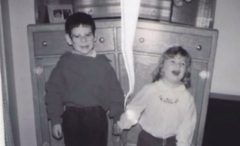In childhood, Lisa Emberley shared a close relationship with her brother. But when he was 18, he was diagnosed with a mental illness.
 “Our relationship changed and so did my entire family dynamic,” says Emberley.
“Our relationship changed and so did my entire family dynamic,” says Emberley.
“I had a lot of questions about mental illness, and was trying to sort out my feelings and figure out what this meant for the future. While searching for answers, I noticed there was a lack of understanding about the impact of mental illness on the sibling without the mental illness.”
So, for her Master’s degree in Neuroscience at Carleton, she decided to focus her research on understanding the experience of being a sibling of someone with mental illness.
“I’d like to find out if and what types of social relationships and stress coping strategies are different for these siblings compared to siblings that do not have a brother/sister with mental illness,” says Emberley. “Additionally, I’d like to know about the emotional feelings siblings have.”
She also plans on researching how this relationship impacts the well-being and future life decisions of the sibling without mental illness (e.g., education, occupation, where to live, choice of romantic relationship, plans for their own future).
 Emberley says that literature indicates that siblings can play as important a role as parents, and sometimes a more important one especially during young adulthood.
Emberley says that literature indicates that siblings can play as important a role as parents, and sometimes a more important one especially during young adulthood.
“This is when they begin to separate from their nuclear family and live away from home, and pursue their own interests such as beliefs, education, career, romantic relationships, as well as, making future life decisions,” explains Emberley.
If a sibling is diagnosed with a mental illness, research shows that the quality of the relationship can change which can then lead to other changes.
On one hand, there can be positive effects such as developing a fuller understanding of others with illnesses and creating closer family relationships. But there can also be challenges such as experiencing mixed and conflicting emotions, increased and divided responsibilities within the family, balancing self and sibling care, and worry about their future life decisions.
Says Emberley: “We expect to find that individuals that have a sibling with a mental illness might have different coping strategies for stressful situations than individuals who do not have a sibling with a mental illness. Siblings of those with mental illness may have more extremes in closeness compared to siblings of those without mental illness. We also expect that, because of their experience, siblings of those with mental illness will take a different direction in career and life plans than those who have siblings without mental illness.”
Emberley has already surveyed 100 young people (ages 18-30) from across Canada who have siblings who have been diagnosed with a mental illness.
Next spring, Emberley plans on posting a summary of her results on the Carleton website and distribute them to mental health and family services organizations “to help others to identify these siblings’ needs and approaches to treatment to improve the lives of all family members.”
Emberley says her research would not have been possible without the help of her supervisors, Drs. Kim Matheson and Hymie Anisman. “I am also forever in debt to my brother, without whom this research would never have been started.”
Tuesday, July 28, 2015 in Grad Student Research, News
Share: Twitter, Facebook



